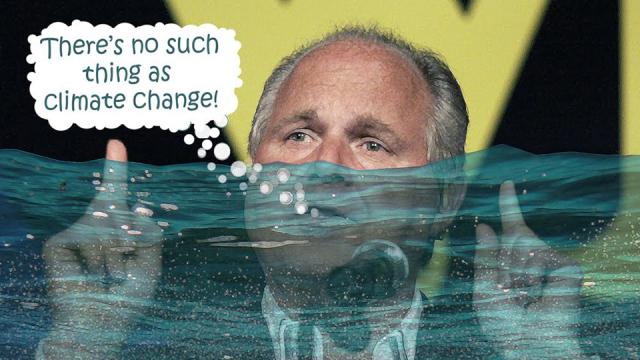
All last year it looked like a bipartisan reform effort in Congress to deal with an economic albatross, the National Flood Insurance Program, was going to pay off. The program was about $25 billion in debt. Reform measures with teeth were going to phase out subsidies for businesses, for second homes, for repeatedly flooded dwellings now raised on stilts and awaiting the next hurricane like dumb seagulls.
Then, in late January, the Senate voted 67 to 32 to gut the reform measures. Arguably the most promising climate-change legislation in years went down the toilet for another four years of delay; that is, if the House agrees with it, which is not yet clear. The White House says it will not exercise any veto.
Nobody wants to face reality here. Why should they?
For almost 50 years the federal government, cheered on by the real estate and building industries, by the Jersey Shore and the Louisiana bayou, by mansion owners who like the tide lapping their pedicured feet and shack dwellers who like feeling sand between their toes, has made facing the real costs of waterfront living and development unnecessary.
As often happens with legislation, good intentions became a road to disaster: the initial program was supposed to limit building in flood plains but did just the opposite.
“Unsound from the start,” is how Nicholas Pinter, a scientist writing in The New York Times, described the program last summer, when the much-needed reform of the runaway monster called NFIP was in the air. Environmentalists and conservatives both agreed the protection program had climate change breathing down its neck. It had become a national burden and needed a thorough overhaul. The debt-logged protection system sheltered more than 22,000 communities under its federal umbrella. Yet climate-change disasters like Irene and Sandy had blown the roof off the payouts.
America’s insurance industry, which finally understands the risks to its very existence from climate change, insisted it would do little to take on flood damages until maps were redrawn of flood-prone regions and rates adjusted for risks looking forward, not just backward, like the industry has looked since its inception.
As the maps were being redrawn, at a cost of about $400 million, those affected got nervous. The real costs of waterfront protection were way more than they were paying. Subsidies were going to be reduced for most, for some eliminated entirely.
Having for years paid low premiums, the homeowners and their allies revolted against change. They screamed bloody hell. Especially wealthy beachfront owners, of which there were a disproportionate number. According to a 2007 Congressional Budget Office survey, 40 percent of the subsidized coastal properties were worth more than half a million dollars, with 12 percent worth over a million dollars.
There was another, more serious problem. Getting dough out of those who could afford it could salvage the flood protection program for the short term but tank it in the long. Economic reasoning said that threatened communities would find insurance rising, often steeply, for all players. Some would bow out of the program, putting the total financial burden on a shrinking base.
This, in turn, would force other policyholders out. The combination of higher rates and a shrinking number of policyholders would continue to spiral until the program collapsed.
“These reforms offered too much tough love and too little compassion for flood-prone homeowners,” said Pinter.
By late 2013, although the reforms still had momentum, they began to look coldly political. Mid-term elections were coming up, voter-approval ratings at historic lows. Said Pinter, “Policy reform and fiscal discipline sound great until you sit across the table from flood-plain residents losing their homes because of skyrocketing insurance premiums.”
Tough love and short sightedness proved a deadly combination in a reform package during hard times. Bipartisan support, across-the-aisle camaraderie and proselytizing for-the-public-good went out the window. It became apparent that there had been little long-term thinking going on behind the scenes: no assistance for low-income homeowners, no graduated buyouts of those in the most vulnerable locations and facing the highest policy increases.
Most importantly, there was no clear, long-term path to higher ground, with help from federal and state governments, for those by ever-rising seas beneath our carbon-loaded sky.
So the Senate beat a hasty retreat, gutting the reform.
An editorial in The Washington Post pinned the cause of the retreat on “sticker shock” from insurance bills. Homeowners “went running to Congress for relief. The unhappiness was concentrated in Sandy-socked New York and New Jersey: Democratic Sen. Robert Menendez of the latter state, along with Republican Johnny Isakson of Georgia, a reliable ally of the real estate industry, co-sponsored the bill, which delays implementation of the higher rates.”
Whatever. Senators of all stripe changed their tunes. What they kept were their boasts of bipartisanship. They’d tried reform, then drowned it cooperatively in a show of compassion. A compromise, a phasing in of flood-insurance rate increases of 25 percent annually over the four-year delay, was rejected by both parties in the Senate.
Now the insurance industry is irked: a cash boost from the higher rates will not fill its coffers. Environmentalists are resigned: an unpredictable Congress continues to be a corollary of unpredictable climate change. Taxpayers? Landlubbers especially should be up in arms but seem apathetic.
A disproportionate amount of our dough goes to the U.S. Treasury to subsidize the NFIP. Lawn-killing droughts, mile-wide tornadoes, interior hurricanes, never-heard-of-before bug infestations, ticks on babies’ scalps, freezer-blast weeks, snow storms in Atlanta, runway forest fires, specie extinctions, and the ongoing menu of climate-change offerings have yet to congeal into a two-word order a majority of taxpayers can hear: DO SOMETHING!
Like vote the bastards out.
So, we heave a sigh over another climate-change debacle. One that held out promise. Instead, we add yet another chapter to our ongoing American saga of doom by dithering. Our Senators, pleased with their efforts, which briefly gathered around them the tattered, old-school virtues of cooperation associated with democracy, hold hands begrudgingly, and smile. We tried.
This, now, with climate change, suffices for victory.
The U.S. Treasury picks up the tab.
3 WAYS TO SHOW YOUR SUPPORT
- Log in to post comments

















